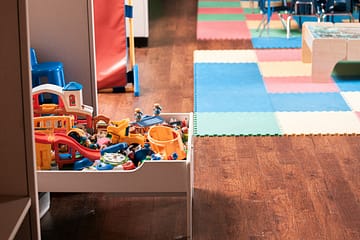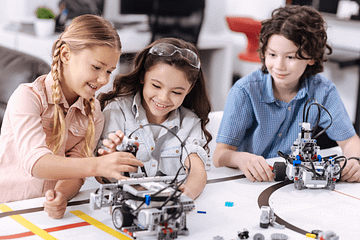As a parent, you want to give toys that help them develop their social and emotional skills. With careful selection, you may locate toys that suit your child’s unique personality and demands. The correct toys may be useful instruments for promoting self-regulation, cooperative games, and social skills. This article provides advice on selecting toys that match your child’s abilities and problems. We will go over how to choose playthings that are appropriate for different developmental ages and demands. You’ll discover what to look for when buying toys for your neurodiverse youngster. With little advice, you may create a toy collection that encourages your child’s development and self-expression.
Play is an essential requirement for all children, serving as a potent catalyst for cognitive, physical, social, and emotional development. For neurodiverse children, play is significantly more important in developing critical life skills. These children benefit from meaningful, engaging play activities that provide vital opportunity to develop emotional intelligence, social competence, and self-regulation skills. Imaginative pretend play encourages neurodiverse youngsters to explore emotions, practice social relationships, and develop empathy in a secure, non-judgmental environment. As kids take on different roles and settings, they learn to understand and regulate their own emotions while also considering the viewpoints of others.
Games and activities that promote collaboration and teamwork are ideal for developing social and emotional skills. These shared experiences help neurodiverse children learn to interact effectively, manage problems, and create a feeling of belonging within a group. Sensory-based play, such as tactile exploration or rhythmic motions, may be extremely relaxing and comforting for neurodiverse youngsters. These exercises help youngsters develop self-awareness, regulate their emotions, and devise good coping mechanisms for difficult situations. By emphasizing play as a learning tool, parents and educators may help neurodiverse children grow socially and emotionally, preparing them for success in all parts of life.
Understanding Social and Emotional Development in Neurodiverse Children
Unique Neurological Wiring
Because of their distinct brain architecture, neurodiverse children perceive the world in unique ways. Their sensory processing, communication methods, and social interactions may differ from cultural norms. Understanding a child’s unique neurology is critical for parents and caregivers.
Building Emotional Intelligence
While neurodiverse children may struggle with traditional emotional cues, they have incredible emotional depth. Nurturing their emotional intelligence entails understanding their individual requirements and developing targeted techniques to assist them in identifying, expressing, and regulating emotions in a healthy manner.
Fostering Social Connections
Neurodiverse youngsters do not always develop social skills spontaneously. However, with time and the correct help, individuals may learn to navigate social situations and form lasting relationships. Celebrate their distinct ideas and skills while helping them through societal complications.
Embracing individuality
Each neurodiverse child has unique needs, interests, and talents. Avoid comparing their own growth to that of others. Instead, concentrate on understanding and nourishing their own development path, as well as appreciating their unique talents and accomplishments.
Understanding the complexities of social and emotional development in neurodiverse children enables you to better support their general well-being and help them succeed in a world that frequently fails to accommodate their outstanding intellect.
Types of Toys for Social and Emotional Development
Cooperative play toys promote collaboration, communication, and social skills. These enable youngsters to socialize, work together, and learn to compromise. Popular choices include board games, building kits, and group activities.
Board games educate you to take turns, follow the rules, and be a good sport. They also encourage conversation and pleasant rivalry. Building sets like LEGO allow children to collaborate toward a common goal while learning problem-solving skills.
Pretend play is essential for cultivating empathy, self-regulation, and perspective-taking. Dolls, playhouses, and dress-up costumes allow youngsters to act out scenarios and learn social roles. Kitchen sets and tool benches create cooperative storytelling because children emulate adult behaviours. Puppets are ideal for presenting stories and exploring emotions. Props like this allow youngsters to safely explore with self-expression.
Enhancing Emotional Understanding and Social Skills
Role-playing toys are effective tools for improving emotional intelligence in neurodiverse youngsters. Children experience many emotions via imaginative play and learn how to recognize and express them appropriately. Whether it’s caring for a new-born doll or acting out a dramatic event with action figures, youngsters acquire empathy by “walking in someone else’s shoes.”
Navigating Social Situations:
These toys can also help youngsters understand the intricacies of social roles and relationships. Dressing up and pretending to be other characters encourages kids to experiment with new behaviours in a secure setting. They learn social standards, develop communication skills, and deal with difficult interpersonal situations.
Developing Self-Regulation:
When immersed in imaginary worlds, children must control their thoughts, emotions, and behaviours to remain “in character.” This self-monitoring enhances important executive functioning abilities such as focused attention and impulsive control. Role-playing promotes the capacity to halt, reflect, and respond correctly, which is essential for social success.
Boosting Confidence and Creativity:
In addition to practical skills, these open-ended toys encourage creativity and self-confidence. Kids feel liberated to experiment with new characters, create tales, and discover their own voice. With no “right” way to play, kids cultivate a growth mentality and the fortitude to keep trying new things.


